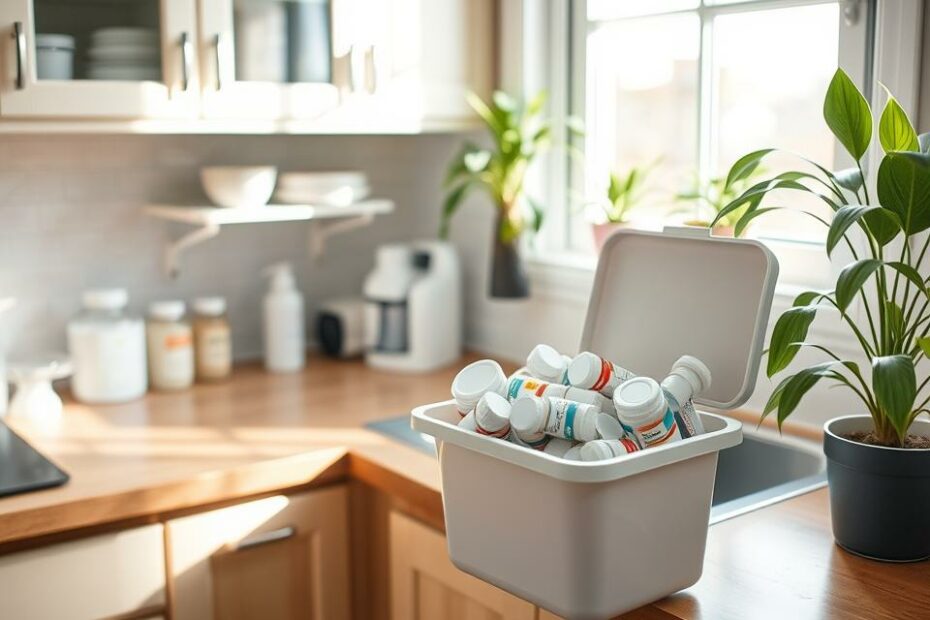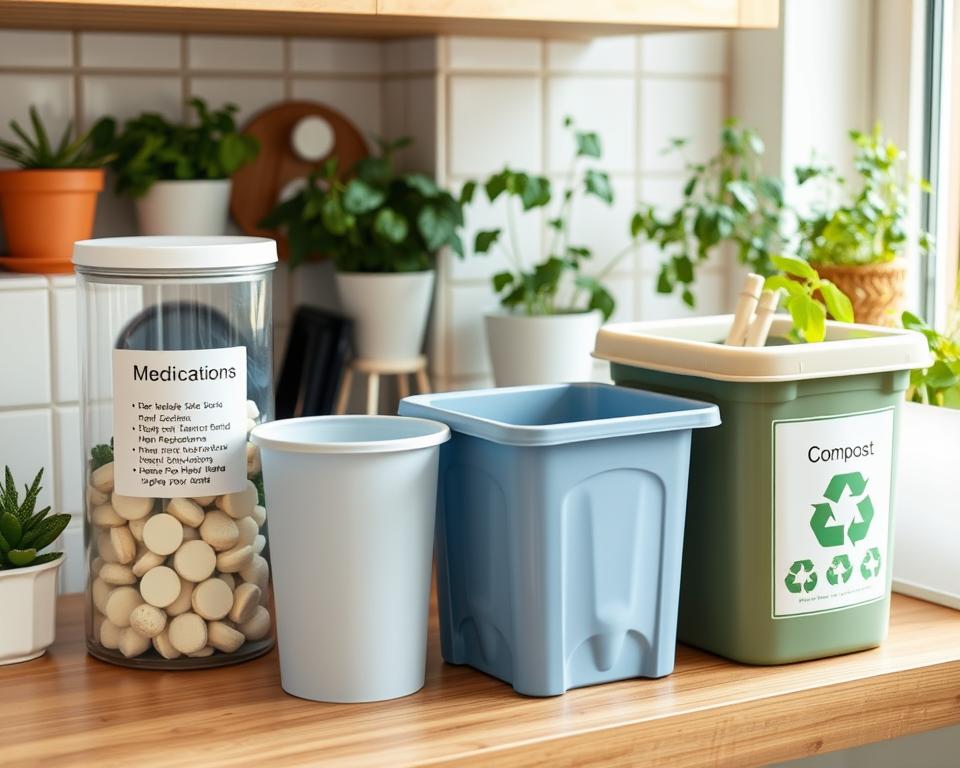As someone who has grappled with the complexities of managing our family’s health, I understand the importance of using antibiotics responsibly. However, the question of how to properly dispose of leftover or expired antibiotics has always been a nagging concern. The thought of these powerful medications ending up in our waterways or harming the environment has weighed heavily on my mind. That’s why I’m eager to dive into this comprehensive guide on the safest ways to dispose of antibiotics.
Key Takeaways
- Understand the environmental and public health impact of improper antibiotic disposal.
- Learn the safest methods for disposing of unused, expired, or unwanted antibiotics.
- Discover best practices for antibiotic waste management in healthcare facilities.
- Explore the role of antibiotic stewardship in reducing unnecessary prescriptions.
- Stay informed about local and national regulations on pharmaceutical waste disposal.
Understanding the Importance of Proper Antibiotic Disposal
Disposing of antibiotics improperly can have serious consequences for the environment and public health. When antibiotics are flushed down the toilet or thrown in the trash, they can contaminate water sources and disrupt aquatic ecosystems. This environmental impact is a significant concern, as the presence of these pharmaceuticals in the water can harm sensitive species and even contribute to the growing problem of antibiotic resistance.
Environmental Impact of Improper Disposal
Studies have shown that antibiotic waste can accumulate in waterways and soil, leading to the development of antibiotic-resistant bacteria. These superbugs pose a serious threat to public health, as they can render common medications ineffective and make infections more difficult to treat. Proper antibiotic waste management is crucial to mitigating this environmental and health hazard.
Antibiotic Resistance and Public Health Concerns
The misuse and improper disposal of antibiotics are major contributors to the rise of antibiotic-resistant bacteria. When these medications are not disposed of correctly, they can linger in the environment and expose bacteria to sublethal doses, allowing them to develop resistance. This, in turn, reduces the effectiveness of antibiotics, putting patients at risk of potentially life-threatening infections that are resistant to treatment.
By understanding the importance of proper antibiotic disposal, individuals and healthcare facilities can play a vital role in preventing the spread of antibiotic resistance and protecting the environment. Responsible pharmaceutical waste management is a crucial step in safeguarding public health and the natural ecosystems we depend on.
Dispose Antibiotics: The Safest Way to Dispose of Unused Medications
Safely disposing of unused antibiotics is crucial to protecting the environment and public health. Improper disposal, such as flushing them down the drain or throwing them in the trash, can lead to the contamination of waterways and the promotion of antibiotic-resistant bacteria. Instead, there are several safe and responsible methods to dispose of leftover antibiotics.
One of the best options is to participate in a local drug take-back program. These initiatives, often organized by law enforcement or healthcare facilities, allow you to drop off your unused medications for proper disposal. Many pharmacies and police stations also offer medication collection bins where you can dispose of your antibiotics safely.
If a take-back program is not available in your area, you can follow these at-home disposal techniques:
- Mix the unused antibiotics with an unpalatable substance, such as kitty litter or used coffee grounds, and place the mixture in a sealed container or plastic bag before throwing it in the trash.
- Remove the medication from its original container and conceal the label or packaging to protect your personal information before disposing of it.
- Check with your local waste management authority to see if they have any specific guidelines or collection events for hazardous waste disposal of unused medications.
By taking these simple steps, you can dispose of antibiotics in a way that minimizes the potential for environmental and public health harm. Responsible antibiotic disposal is a crucial part of maintaining the effectiveness of these vital medications and protecting our shared resources.
“Proper disposal of unused antibiotics is essential to prevent the spread of antibiotic-resistant bacteria and protect our environment.”
Expired Medication Disposal: What You Need to Know
Properly disposing of expired antibiotics is crucial for safeguarding the environment and public health. Expired medication, including antibiotics, can pose serious risks if not handled correctly. Understanding the proper procedures for expired medication disposal can help mitigate the potential dangers associated with improper disposal.
Checking Expiration Dates and Safe Storage
Regularly checking the expiration dates of your antibiotics is the first step in ensuring safe disposal. Antibiotics should be stored in a cool, dry place, away from direct sunlight, until they are ready to be used or disposed of. Avoid keeping expired antibiotics in your medicine cabinet, as this can increase the risk of accidental ingestion or misuse.
If you discover expired antibiotics, it’s essential to follow the recommended guidelines for their safe disposal. Improper disposal, such as flushing them down the toilet or throwing them in the trash, can contaminate water sources and contribute to the spread of antibiotic-resistant bacteria, posing a threat to public health and the environment.
| Expired Medication Disposal | Proper Antibiotic Disposal | Safe Drug Disposal |
|---|---|---|
| – Check expiration dates regularly | – Store antibiotics in a cool, dry place | – Avoid flushing or throwing in the trash |
| – Safely dispose of expired medications | – Follow recommended disposal guidelines | – Use designated drug take-back programs |
| – Prevent environmental contamination | – Protect against antibiotic resistance | – Safeguard public health and the environment |
By understanding the importance of expired medication disposal and following the recommended guidelines, you can play a crucial role in preserving the environment and public health.
Safe Drug Disposal Methods for Households
Properly disposing of unused or expired antibiotics is crucial to safeguarding the environment and public health. Households have several safe and convenient options when it comes to disposing antibiotics, safe drug disposal, and following medicine disposal guidelines.
One of the most recommended methods is to participate in local take-back programs. These initiatives, often organized by law enforcement or municipal authorities, allow you to safely turn in your unwanted medications for proper disposal. This helps keep these substances out of landfills and waterways.
If a take-back program is not available, you can also locate designated hazardous waste collection sites in your area. These specialized facilities are equipped to handle the safe disposal of pharmaceutical waste, ensuring it is handled responsibly.
For medications that cannot be returned, the FDA suggests an at-home disposal technique. Simply mix the drug with an unpalatable substance, such as dirt or cat litter, and place the mixture in a sealed container or bag before throwing it in the trash.
By adopting these safe drug disposal practices, households can do their part in disposing antibiotics and protecting the environment and public health from the risks of improper medication management.
| Disposal Method | Advantages | Disadvantages |
|---|---|---|
| Take-back Programs |
|
|
| Hazardous Waste Collection Sites |
|
|
| At-Home Disposal |
|
|
Antibiotic Waste Management: Best Practices for Healthcare Facilities
Proper management of antibiotic waste is crucial in healthcare settings to mitigate environmental risks and combat the growing threat of antibiotic resistance. Healthcare facilities play a pivotal role in antibiotic stewardship and must adhere to robust pharmaceutical waste disposal guidelines.
Segregation and Proper Labeling
The first step in effective antibiotic waste management is the segregation and labeling of waste. Healthcare facilities should establish clear protocols for separating antibiotic waste from other types of medical waste. This ensures that the waste is handled and disposed of appropriately.
- Segregate antibiotic waste into dedicated, color-coded containers or bags.
- Clearly label the containers with the contents and relevant antibiotic waste management information.
- Train staff on the importance of proper segregation and labeling to prevent cross-contamination.
Incineration and Alternative Disposal Methods
Once segregated and labeled, antibiotic waste should be disposed of through approved channels. Incineration is a widely accepted method, as it effectively destroys the active pharmaceutical ingredients and reduces the risk of environmental contamination.
However, healthcare facilities should also explore alternative disposal methods that are environmentally friendly and comply with local medicine disposal guidelines. These may include chemical deactivation, autoclaving, or specialized waste management services.
“Proper disposal of antibiotic waste is not only a legal requirement but a moral obligation to protect the environment and public health.”
By implementing robust antibiotic waste management practices, healthcare facilities can contribute to the broader efforts to combat antibiotic resistance and promote sustainable, responsible pharmaceutical waste disposal.
Antibiotic Stewardship: Reducing Unnecessary Prescriptions
Antibiotic stewardship plays a crucial role in combating the growing issue of antibiotic resistance and minimizing the need for unused antibiotics disposal. Healthcare providers have a responsibility to prescribe antibiotics judiciously, ensuring they are only used when absolutely necessary.
One of the primary goals of antibiotic stewardship is to educate patients on the proper use and disposal of these medications. By raising awareness, healthcare professionals can empower individuals to be more mindful of their antibiotic consumption and disposal practices, ultimately contributing to the prevention of antibiotic resistance.
- Encourage healthcare providers to carefully evaluate the need for antibiotic prescriptions, considering alternative treatments when appropriate.
- Educate patients on the importance of completing the full course of antibiotics as prescribed, even if they start feeling better.
- Advise patients to never share or save leftover antibiotics for future use, as this can lead to the development of antibiotic resistance.
- Promote the proper disposal of unused antibiotics through designated collection sites or take-back programs.
By fostering a culture of responsible antibiotic stewardship, healthcare providers can play a crucial role in reducing the amount of unused antibiotics that need to be disposed of, ultimately contributing to the overall prevention of antibiotic resistance.
“Proper antibiotic stewardship is essential in the fight against the growing threat of antibiotic resistance. Healthcare providers must lead the way in ensuring antibiotics are prescribed judiciously and patients are educated on their responsible use and disposal.”
Pharmaceutical Waste: Regulations and Guidelines
The proper disposal of pharmaceutical waste, including unused or expired antibiotics, is governed by a complex web of local and national regulations. Understanding these guidelines is crucial for ensuring the safety of individuals, the community, and the environment.
Local and National Laws on Medicine Disposal
Across the United States, state and municipal authorities have established specific guidelines for the disposal of pharmaceutical waste. These regulations often vary based on the type of medication, the volume of waste, and the disposal methods permitted. Healthcare facilities, in particular, must adhere to strict protocols to ensure compliance with local and federal laws.
- Many municipalities offer drug take-back programs or designated drop-off locations for the safe disposal of unused medications.
- The U.S. Drug Enforcement Administration (DEA) also coordinates National Prescription Drug Take Back Days, providing convenient options for individuals to responsibly dispose of their unused or expired medicines.
- The U.S. Environmental Protection Agency (EPA) has established regulations for the management and disposal of hazardous pharmaceutical waste, including antibiotics, to minimize the environmental impact.
It is essential for both individuals and healthcare providers to familiarize themselves with the applicable laws and guidelines in their area to ensure the proper and lawful disposal of pharmaceutical waste, including antibiotics.
| Regulation | Scope | Key Considerations |
|---|---|---|
| Resource Conservation and Recovery Act (RCRA) | Federal | Establishes guidelines for the management and disposal of hazardous waste, including certain pharmaceutical waste. |
| Clean Water Act (CWA) | Federal | Regulates the discharge of pollutants, including pharmaceutical residues, into waterways. |
| State and Local Regulations | State and Municipal | Vary by location, often providing more specific guidance on the disposal of pharmaceutical waste within their jurisdictions. |
By adhering to the appropriate regulations and guidelines, individuals and healthcare facilities can play a vital role in protecting the environment and public health by responsibly disposing of pharmaceutical waste, including unused antibiotics.
Medicine Disposal Guidelines: Protecting the Environment
Proper disposal of medicines, including antibiotics, is crucial for safeguarding the environment and public health. To minimize the impact of pharmaceutical waste, individuals and healthcare facilities must follow established medicine disposal guidelines.
Responsible Disposal of Liquid and Solid Medications
When disposing of liquid and solid medications, it’s important to follow these guidelines:
- For liquid medications, mix them with an unpalatable substance like dirt, cat litter, or used coffee grounds before placing them in a sealed container or bag and discarding them in the household trash.
- Solid medications, such as pills or capsules, should be removed from their original containers, crushed, and mixed with an undesirable substance before disposal in the household trash.
- Avoid flushing medicines down the drain or toilet, as this can contaminate water sources and harm aquatic ecosystems.
- Check with your local pharmacy or waste management authority for any community drug take-back programs or special collection events that provide safe and environmentally responsible disposal options.
By following these medicine disposal guidelines, individuals can help protect the environment and prevent the accumulation of antibiotic waste in our natural resources.
“Proper disposal of unused or expired medications is crucial for safeguarding the environment and public health.” – Environmental Protection Agency
Healthcare facilities, such as hospitals and clinics, have a greater responsibility when it comes to antibiotic waste management. They must ensure the safe and proper disposal of all pharmaceutical waste, including antibiotics, through segregation, incineration, and other approved methods. By adhering to these safe drug disposal practices, healthcare providers can contribute to the reduction of antibiotic resistance and the protection of the environment.
Antibiotic Resistance Prevention: The Role of Proper Disposal
Proper antibiotic disposal plays a crucial role in preventing the spread of antibiotic resistance, a growing global health concern. When antibiotics are disposed of improperly, they can contaminate the environment and contribute to the development of resistant bacteria, posing serious threats to public health.
Improper disposal of unused or expired antibiotics can lead to the release of these drugs into water systems, soil, and even drinking water. This exposure allows bacteria to adapt and become resistant to the very medications designed to eliminate them. The consequences of this can be dire, as resistant infections become increasingly difficult to treat, leading to prolonged illnesses, higher healthcare costs, and even increased mortality rates.
To combat this issue, it is essential that individuals and healthcare facilities alike prioritize the proper disposal of antibiotics. This includes following guidelines and regulations for the safe disposal of both liquid and solid medication forms, ensuring that these potentially hazardous substances do not enter the environment and contribute to the growing problem of antibiotic resistance.
“Proper disposal of antibiotics is a critical step in preventing the spread of antibiotic-resistant bacteria and protecting public health. By responsible medication management, we can make a significant impact in safeguarding the future of effective antibiotics.”
By taking the necessary steps to dispose of unused antibiotics in a responsible manner, we can play a vital role in antibiotic resistance prevention and preserve the effectiveness of these crucial medical treatments for generations to come.
| Proper Antibiotic Disposal Methods | Benefits |
|---|---|
| Returning unused antibiotics to a local pharmacy or drug take-back program | Ensures safe and environmentally responsible disposal, preventing the release of antibiotics into the ecosystem |
| Mixing liquid antibiotics with an unpalatable substance (such as dirt, cat litter, or used coffee grounds) before throwing them in the trash | Deters individuals from using the medications improperly and minimizes the risk of environmental contamination |
| Crushing or breaking solid antibiotic medications before disposing of them in the trash | Discourages potential misuse and helps prevent the drugs from entering water sources or being recovered from landfills |
Conclusion: Embracing a Responsible Approach to Antibiotic Disposal
As we have explored throughout this comprehensive guide, the proper disposal of antibiotics is crucial for safeguarding the environment and public health. By embracing a responsible approach to dispose antibiotics, we can mitigate the impact of these powerful medications on our ecosystems and prevent the alarming rise of antibiotic resistance.
The key to achieving this lies in our individual and collective efforts to adhere to the recommended safe drug disposal methods outlined in this article. From carefully checking expiration dates and storing medications securely to utilizing designated medication take-back programs, each of us has a vital role to play in ensuring the proper antibiotic disposal.
By taking these proactive steps, we can protect our water sources, minimize the release of drug residues into the environment, and ultimately contribute to the ongoing fight against the global threat of antibiotic resistance prevention. Together, we can make a meaningful difference and ensure the continued effectiveness of these life-saving medications for generations to come.
FAQ
What are the environmental and public health concerns associated with improper antibiotic disposal?
Improper disposal of antibiotics, such as flushing them down the drain or throwing them in the trash, can lead to the contamination of water sources and the development of antibiotic-resistant bacteria, which poses a significant threat to public health.
What are the safest methods for disposing of unused or expired antibiotics?
The safest methods for disposing of unused or expired antibiotics include take-back programs, hazardous waste collection sites, and at-home disposal techniques such as mixing the medication with an unpalatable substance and placing it in the trash.
How can healthcare facilities properly manage antibiotic waste?
Healthcare facilities should segregate and properly label antibiotic waste, and utilize disposal methods such as incineration and alternative techniques to minimize environmental and public health risks.
What is the role of antibiotic stewardship in reducing unnecessary antibiotic prescriptions and waste?
Antibiotic stewardship programs, which promote the judicious use of antibiotics by healthcare providers and educate patients on proper usage and disposal, can help reduce the amount of unused or expired antibiotics that need to be disposed of, thereby contributing to the prevention of antibiotic resistance.
What are the local and national regulations governing the disposal of pharmaceutical waste, including antibiotics?
Individuals and healthcare facilities must adhere to local and national laws and regulations when disposing of unused or expired medications, including antibiotics. These guidelines are in place to ensure the safe and responsible management of pharmaceutical waste.
How can proper antibiotic disposal help prevent the spread of antibiotic resistance?
Responsible disposal of antibiotics, in accordance with recommended guidelines, helps mitigate the development and transmission of antibiotic-resistant bacteria, which is a crucial factor in preserving the effectiveness of these vital medications and protecting public health.





